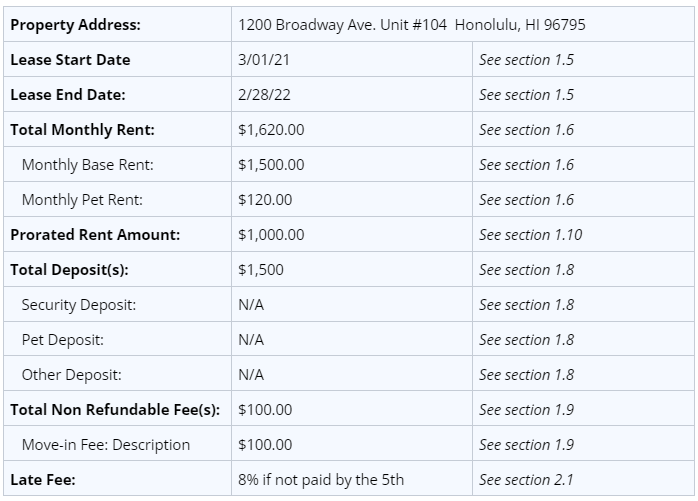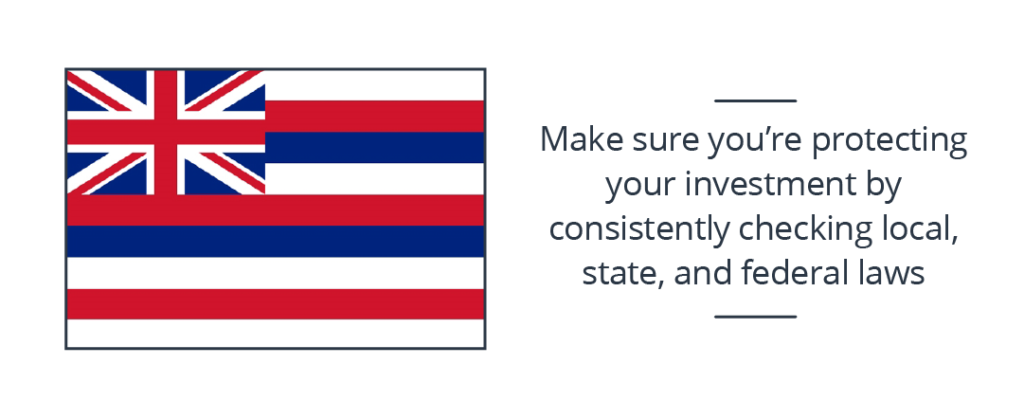Table of Contents
- Hawaii Renters’ Rights and Landlord Responsibilities
- Hawaii Landlords’ Rights and Tenant Responsibilities
- Rental Application Fees
- Criminal Background Check
- Lease Agreement Disclosures
- Hawaii Lease Agreement Example
- Hawaii Landlord-Tenant Law FAQ
- Due Diligence and Hawaii Rental Laws
- Hawaii Landlord-Tenant Law Resources
Hawaii is probably on the top of the list for anyone looking to relocate, or at least, it should be. From the beautiful beaches to the great weather year round, Hawaii is an excellent place to settle down. This is also a perfect place for those looking to invest in properties. The homes here have always gone up in value, which means more bang for your buck as an investor.
Laws that impact the rental market, landlords, and tenants are constantly being decided in states. Make sure you know what’s on your ballot – find Hawaii voting information.

Hawaii Renters’ Rights and Landlord Responsibilities
- Have 14 days to return security deposit
- A 45-day notice required before raising rent
- Must give a two-day notice before entering
- Required to make repairs within 15 days
When it comes to Hawaii rental laws, there are a few specifics landlords need to know:
- Security Deposit – Hawaii limits the amount a landlord may charge for the security deposit to the equivalent of one month’s rent. Landlords must return the deposit within 14 days of the tenant moving out.
- Raising Rent – Landlords in Hawaii may increase the rent to any amount for any reason with a 45-day notice.
- Notice of Entry – Hawaii requires landlords to give a two-day notice before entering the property.
- Repairs – It is the landlord’s responsibility to keep the rental in safe and healthy living conditions. Landlords must make repairs within 15 days after being notified by the tenant. If the landlord fails to make repairs within this time frame, tenants may withhold rent or make the repairs themselves and deduct the cost from future rent payments.
Hawaii Landlords’ Rights and Tenant Responsibilities
- Tenants have five days to pay rent after they receive a notice
- Must give a 28-day notice before terminating a lease
- Tenants must keep the unit in safe and habitable condition
- Landlord must store abandoned property and attempt to contact the tenant
- Overdue Rent – If a tenant fails to pay rent on time, the landlord must give them five days’ notice to pay or quit. If the tenant fails to pay, the landlord may file for eviction.
- Terminating a Lease – If a tenant needs to terminate a month-to-month lease, they must give the landlord a 28-day notice.
- Tenant Responsibilities – Tenants are required to keep the property clean, not disturb neighbors, and make small repairs.
- Abandoned Property – If a tenant moves out and leaves personal property, the landlord must notify them and store the property for 15 days. After this time period, if the tenant has failed to claim the property, the landlord may dispose of the property however they see fit.
Rental Application Fees
There are no additional rental application fee laws in Hawaii.
Criminal Background Check
- HUD (Federal) laws do not classify criminal backgrounds as a protected class, but making a decision to rent based off a criminal background alone could lead to a discrimination charge as it impacts certain protected groups of people disproportionately.
- However, if the criminal background check revealed a crime for the manufacture and distribution of drugs, homicide and/or stalking, denying the application is allowed.
- Landlords should have a consistent and equal policy or procedure in place to follow regarding criminal background checks so as not to discriminate against one class of people over another.
- HUD states that a landlord cannot ask about arrest records, only convictions, as innocent people are commonly arrested though the situation may not have resulted in a conviction.
- Some municipalities may have written their own laws expanding onto what you can and cannot ask regarding criminal backgrounds during the tenant screening process.
Lease Agreement Disclosures
- Landlords must provide an inventory of the rental unit conditions, including all furnishings and appliances, prior to move in.
- If the landlord does not live on the island where the rental unit is located, they must appoint an on-island agent for the property. The name and address of each person authorized to manage the premises (who will be receiving and receipting rent, notices, service of process and demand) must be presented to the tenant in writing, before or during the lease signing. The authorized manager of the property’s information must be kept current at all times.
Build a Hawaii lease agreement in less than 15 minutes.
Hawaii Lease Agreement Example
There are three sections to a residential lease agreement. The first section outlines the custom details of the contract, such as who’s involved and for what address. Here’s an example Hawaii lease agreement listing details found in Section 1:
Hawaii Landlord-Tenant Law FAQ
Below are answers to some of the most commonly-asked questions when it comes to landlord-tenant laws in Hawaii:
Can You Withhold Rent in Hawaii?
Yes. Tenants may withhold rent if a landlord fails to make requested repairs.
How Long Does it Take to Evict a Tenant in Hawaii?
Evicting a tenant in Hawaii can take anywhere from one to four months, depending on the reason for eviction.
Is Hawaii a Landlord-Friendly State?
Hawaii is a less landlord-friendly state because tenants have more rights compared to many other states.
What is the Eviction Process in Hawaii?
There are seven reasons a landlord may file for eviction in Hawaii. The seven reasons include failure to pay rent, violation of the lease agreement, the end of the lease term, demolition of the rental unit, short-term rental conversion, condo conversion, and illegal activity. Depending on the violation, the landlord must give the tenant notice and anywhere from 5 to 120 days to cure their violation or quit.
If the tenant fails to cure or quit, then the landlord may file a complaint with the court, which costs $155. After the complaint is filed, it will be served to the tenant within a few weeks.
After the tenant is served with the summons, they must file an answer with the court within seven days. Once the answer is filed, a hearing will be scheduled within a few days to a few weeks.
If the court rules in favor of the landlord, then a writ of possession will be issued. The tenant will then need to move out within a designated time period.
How Much Notice Does a Landlord Have to Give a Tenant to Move Out in Hawaii?
Landlords must give a 45-day notice before asking a tenant to vacate the property.
Due Diligence and Hawaii Rental Laws
TurboTenant has utilized many municipal sources along with official state statutes in order to compile this information to the best of our ability. However, local laws are always in flux, and landlords and tenants alike should do their due diligence and consult legal help when it’s needed. We hope the following list can serve as a valuable resource and allow you to succeed as a landlord or tenant in Hawaii. Be sure to take proper precautions when it comes to finding the top candidates for your unit by utilizing our online rental application and tenant screening services.
Disclaimer: TurboTenant, Inc does not provide legal advice. This material has been prepared for informational purposes only. All users are advised to check all applicable local, state, and federal laws, and consult legal counsel should questions arise.

Unlimited Everything.
Create a single Hawaii lease agreement, or subscribe and receive unlimited lease agreements, landlord forms pack, and e-signs for a simple annual fee. Be confident with all the legal forms and tools you need as a professional landlord.
Discover Our Unlimited PlanHawaii Landlord-Tenant Law Resources
- Residential Landlord-Tenant Code
- Landlord and Tenant Law
- Landlord-Tenant Handbook
- Landlord/Tenant – Marine Corps Base Hawai’i
- Landlord and Tenant Law in the state of Hawai’i
- Hawaii’s Landlord-Tenant Code – Department of Commerce and Consumer Affairs
Hawaii Fair Housing Resources
Other State Resources
Hawaii Associations
Hawaii City-Specific Housing Resources
Honolulu County
- Landlord information packet – City and County of Honolulu
- Section 8 – City and County of Honolulu
- Honolulu Board of REALTORS®
Maui County
Federal Fair Housing Resources







